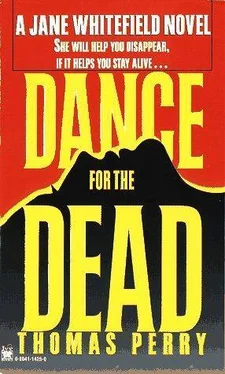Thomas Perry - Dance for the Dead
Здесь есть возможность читать онлайн «Thomas Perry - Dance for the Dead» весь текст электронной книги совершенно бесплатно (целиком полную версию без сокращений). В некоторых случаях можно слушать аудио, скачать через торрент в формате fb2 и присутствует краткое содержание. Жанр: Старинная литература, на английском языке. Описание произведения, (предисловие) а так же отзывы посетителей доступны на портале библиотеки ЛибКат.
- Название:Dance for the Dead
- Автор:
- Жанр:
- Год:неизвестен
- ISBN:нет данных
- Рейтинг книги:4 / 5. Голосов: 1
-
Избранное:Добавить в избранное
- Отзывы:
-
Ваша оценка:
- 80
- 1
- 2
- 3
- 4
- 5
Dance for the Dead: краткое содержание, описание и аннотация
Предлагаем к чтению аннотацию, описание, краткое содержание или предисловие (зависит от того, что написал сам автор книги «Dance for the Dead»). Если вы не нашли необходимую информацию о книге — напишите в комментариях, мы постараемся отыскать её.
Dance for the Dead — читать онлайн бесплатно полную книгу (весь текст) целиком
Ниже представлен текст книги, разбитый по страницам. Система сохранения места последней прочитанной страницы, позволяет с удобством читать онлайн бесплатно книгу «Dance for the Dead», без необходимости каждый раз заново искать на чём Вы остановились. Поставьте закладку, и сможете в любой момент перейти на страницу, на которой закончили чтение.
Интервал:
Закладка:
Jane could sense that Mary Perkins was backing closer to whatever she had been concealing, so she waited patiently.
"What happened to me," said Mary Perkins, "well, not exactly to me - but what happened was that one day in 1982 Congress passed the Garn-Saint Germain Act. It pretty much got rid of all the rules for savings and loan companies. They could charge what they wanted, pay what they wanted, buy and sell what they wanted, take deposits in any amount from anywhere, and then lend it to whomever they wanted, or even forget about lending and invest it themselves. I could see that this was maybe the first great opportunity in American life since the discovery of gold at Sutter's Mill, so I jumped at it."
She glanced at Jane to see if her expression had changed, but it had not, so she went on. "It wasn't only that the rules had changed, but that there was nobody to enforce them. That was part of the program. If you don't have regulations, you don't have to hire regulators. Reagan was cutting the size of the government payroll."
Jane had finally learned something true about Mary Perkins. She was a thief. But until she knew more about what Mary Perkins had stolen, there would be no way to know who was after her. "'What did you have to do with savings and loans?"
"I started working in one right out of college. When I got there, the regulators still knew all the players and all the rules were fifty years old. The money coming in was all from local people with passbooks, and the money going out was for mortgages on local one-family houses."
"I take it you were one of the ones who changed all that?"
"No, not little me. I just came to the party. That's what it was like - a party. You have to understand what was happening. One day the rules change, so each savings and loan sets its own rates. The next day, deposit brokers start taking money from everywhere in the world, breaking it down into hundred-thousand-dollar chips and depositing the chips in whatever institution anywhere in the country had the highest interest that day. So if Bubba and Billy's Bank in Kinkajou, Texas, gives an extra quarter point, suddenly it's got millions of dollars being deposited: Arab oil money, skim-off money from business, drug money from L.A. and Miami, Yakuza money from Japan, money the C.I.A. was washing to slip to some tyrant someplace, and lots of tax money."
"Wait. You did say 'tax money'?" Maybe Jane had been wrong about the men in the airport. If they were federal agents of some kind, they might be prepared in advance to follow a woman like this.
"Sure. You think they keep it in a big box under the president's bed? Say there's a billion-dollar budget for some program. It's got to be in short-term CDs so they can use it when they need it. A loan broker pops it in wherever the interest is highest. Haifa year's interest on a billion dollars at eight percent is forty million, right?"
"If you say so."
"And this is money that can't rest. It can't stay put if there's another bank that's offering higher interest. One point of interest on one billion is ten million dollars. There were all kinds of city-government funds, college budgets, whole states that got their money a few months before they spent it. They counted on the timing and figured the interest in as a way to stretch it. And it didn't matter if the money was in the Bank of America or the Bank of Corncob, Iowa, because it was all insured."
"How did this create an opportunity for you?"
"Forget about me for a minute. A few other things had to change first. Glockenspiel City Savings is suddenly a happening thing."
"What's Glockenspiel City Savings?"
"You know, the little storefront with a million in assets built up over twenty years. One day they offer a nice rate on their CDs; the next week they've got four hundred million in deposits. That happened a hell of a lot more often than you'd think. There are little pitfalls, though. They're offering, say, nine percent. That means they've got to turn maybe ten, even twelve to make a profit. There's very little in Glockenspiel City that you can invest in that pays ten percent, and nothing at all that you can invest four hundred million in. So you've got to invest it the way you got it. in the great wide world outside Glockenspiel City,"
Mary Perkins was telling all this with relish, as though she weren't sitting in a car speeding across the dark Midwest to keep her alive. She seemed to be calming herself by wandering in territory that was familiar to her, a place that was filled with numbers. Jane let her talk.
"Glockenspiel Savings is run by a guy named Cyrus Curbstone. He goes along for years and years, paying three percent on savings, charging six percent on loans. He knows his limits because they've been written down in a law since the thirties. He's honest. He was born there, and he's got two plots in the cemetery for him and Mrs. Curbstone, right behind Great-grandma and one row over from Colonel Curbstone, who got shot in the ass at Gettysburg. But I know Cyrus Curbstone is vulnerable."
"You said he was honest. What's his weakness?"
"One day Cyrus wakes up and finds himself on another planet. He's got to pay nine percent and charge twelve. His million-dollar bank suddenly has four hundred million in deposits. He can't invest it fast enough in the usual way to make the forty or fifty million he needs to turn a profit. In walks a nice person: maybe me. Maybe I've been referred to him by a deposit broker who's been putting lots of those hundred-thousand-dollar chips in the bank. Or I simply happened to meet one of his regular customers socially. Anyway, I'm a developer, or the general partner in a limited partnership. I've got a piece of land that's been appraised for twenty million, I want to develop it as a resort, and I need a loan of ten million to finance it."
"Is the land real?"
"Sure. That doesn't mean I own it, or that it's worth anything like twenty million."
"Didn't they look at deeds?"
"Sure. The owner is Pan-Financial Enterprises of San Diego, or Big Deals of Boca Raton. I'm an officer."
"How did you make it look like it was worth twenty million?"
"In those days there was no licensing law for appraisers anywhere in the country. So I'd get an appraisal that said what I wanted. Then we'd do a land-flip."
"What's that?"
"Buy it for a million. Sell it to your brother-in-law for six million. He sells it back to you for ten. You sell it to Big Deals, Inc. for twenty."
"That worked?"
"Of course it worked. They've been doing it since the Romans."
"If it was that stale, wasn't it risky?"
"You've heard of the term 'motivated seller'?"
"Yes."
"Well, the day after Cyrus Curbstone starts getting these brokered deposits, he becomes a motivated lender. He's got four hundred million to lend out. If he makes ten percent, that's forty million a year. He pays his depositors nine percent, or thirty-six million, pays his overhead, and he's got maybe two million left in profit. He's part owner, or at least a big stockholder. The others are local people, friends of his. He wants that profit. But if he lets the deposits sit in the vault, he's losing three million a month. That's a hundred thousand a day. That's almost forty-two hundred an hour. I mean, it's costing this guy thirty-three thousand dollars to sleep eight hours."
"You're saying Cyrus fooled himself."
"No. Cyrus had never played for big numbers before, but he wasn't stupid. I was a nice, personable businesswoman. I dressed well. I smelled good, I smiled, I had money. I had a hot business and I wanted to expand. Hot businesses need banks. Banks need hot businesses. He got fooled because he was doing exactly what he was supposed to do: for the first few years, a great company looks exactly like the company I was showing him. So he cut a check."
Читать дальшеИнтервал:
Закладка:
Похожие книги на «Dance for the Dead»
Представляем Вашему вниманию похожие книги на «Dance for the Dead» списком для выбора. Мы отобрали схожую по названию и смыслу литературу в надежде предоставить читателям больше вариантов отыскать новые, интересные, ещё непрочитанные произведения.
Обсуждение, отзывы о книге «Dance for the Dead» и просто собственные мнения читателей. Оставьте ваши комментарии, напишите, что Вы думаете о произведении, его смысле или главных героях. Укажите что конкретно понравилось, а что нет, и почему Вы так считаете.












